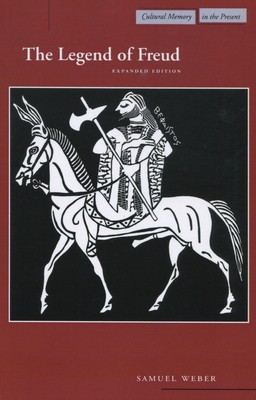
- We will send in 10–14 business days.
- Author: Samuel Weber
- Publisher: Stanford University Press
- ISBN-10: 0804731209
- ISBN-13: 9780804731201
- Format: 14 x 21.6 x 1.9 cm, kieti viršeliai
- Language: English
- SAVE -10% with code: EXTRA
Reviews
Description
Psychoanalysis is dead! Again and again this obituary is pronounced, with ever-increasing conviction in newspapers and scholarly journals alike. But the ghost of Freud and his thought continues to haunt those who would seal the grave. The Legend of Freud shows why psychoanalysis has remained uncanny, not just for its enemies but for its advocates and practitioners as well--and why it continues to fascinate us. For psychoanalysis is not just a theory of psychic conflict: it is a thought in conflict with itself. Often violent, the conflicts of psychoanalysis are most productive where they remain unresolved, thus producing a text that must be read: deciphered, interpreted, rewritten. Psychoanalysis: legenda est.
Review
The Legend of Freud is a fine example of what can be done with Freud's texts when philosophical and literary approaches converge, and you leave the couch in the other room. . . . Like Lacan and Derrida, Weber doesn't so much explain or interpret Freud as engage him, performing what Freud would have called an Auseinandersetzung, a discussion or argument that's also a taking apart, a deconstruction. . . . Deconstruction has picked up a bad name, especially in the minds of those who don't understand it; but this wouldn't be the case if there were more books like Weber's. The Legend of Freud is the best deconstructive work I've seen lately, and the best response to Freud; it merits close attention from anyone who wants a challenge, not merely a guide to what's right and wrong. . . . Weber is brilliantly imaginative, respectful of his subject and his readers, and productive of new ideas.
--Village Voice Literary Supplement
EXTRA 10 % discount with code: EXTRA
The promotion ends in 23d.13:31:44
The discount code is valid when purchasing from 10 €. Discounts do not stack.
- Author: Samuel Weber
- Publisher: Stanford University Press
- ISBN-10: 0804731209
- ISBN-13: 9780804731201
- Format: 14 x 21.6 x 1.9 cm, kieti viršeliai
- Language: English English
Psychoanalysis is dead! Again and again this obituary is pronounced, with ever-increasing conviction in newspapers and scholarly journals alike. But the ghost of Freud and his thought continues to haunt those who would seal the grave. The Legend of Freud shows why psychoanalysis has remained uncanny, not just for its enemies but for its advocates and practitioners as well--and why it continues to fascinate us. For psychoanalysis is not just a theory of psychic conflict: it is a thought in conflict with itself. Often violent, the conflicts of psychoanalysis are most productive where they remain unresolved, thus producing a text that must be read: deciphered, interpreted, rewritten. Psychoanalysis: legenda est.
Review
The Legend of Freud is a fine example of what can be done with Freud's texts when philosophical and literary approaches converge, and you leave the couch in the other room. . . . Like Lacan and Derrida, Weber doesn't so much explain or interpret Freud as engage him, performing what Freud would have called an Auseinandersetzung, a discussion or argument that's also a taking apart, a deconstruction. . . . Deconstruction has picked up a bad name, especially in the minds of those who don't understand it; but this wouldn't be the case if there were more books like Weber's. The Legend of Freud is the best deconstructive work I've seen lately, and the best response to Freud; it merits close attention from anyone who wants a challenge, not merely a guide to what's right and wrong. . . . Weber is brilliantly imaginative, respectful of his subject and his readers, and productive of new ideas.
--Village Voice Literary Supplement


Reviews